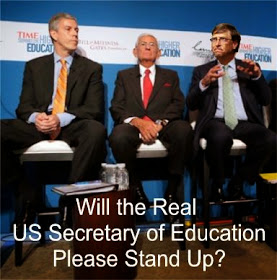New book: Obama’s Education Department and Gates Foundation were closer than you thought

Megan E. Tompkins-Stange is an assistant professor of public policy at the Ford School of Public Policy at the University of Michigan who has written a highly revealing book about the power and influence of four major foundations in education-reform policy in recent years.
She researched “Policy Patrons: Philanthropy, Education Reform, and the Politics of Influence” over several years, in which she was given access to officials in four foundations — Bill and Melinda Gates, Eli and Edythe Broad, Ford, and W.K. Kellogg— as well as permission to quote people without attribution.
It would, of course, be better to know exactly who said what, but Tompkins-Stange is able nonetheless to give enough context so that the power of the words she recorded from 60 interviews contributes to the overall narrative. “Policy Patrons” looks at the effect of the unprecedented philanthropic engagement in public education reform during the Obama administration and raises questions about whether democracy is usurped when private individuals use their fortunes to bend public policy to their own priorities.
Regular readers of this blog know that some wealthy foundations — especially the Bill and Melinda Gates Foundation, the world’s largest, but also the Eli and Edythe Broad Foundation — have in recent years taken unusually active roles in trying to align public policy with their education goals, such as the Common Core State Standards and charter schools.
Indeed, the involvement of foundations in corporate school reform — which, broadly, has been an attempt to change public education to operate like a private business rather than as a civic institution — has been unprecedented in the history of American public education. Tompkins-Stange wrote: “Arguably, no social sector in the United States is more heavily impacted by foundations than K-12 education.”
To understand just how influential the Gates Foundation has been with the Obama administration in terms of education policy, consider this passage from the book, which refers to Arne Duncan, Obama’s education secretary from 2009 to the end of last year:
Gates’s cultivation of relationships with elites extended beyond local and state contexts and into the federal government. Several interviewees cited the appointment of President Obama’s Secretary of Education, Arne Duncan, former superintendent of the Chicago Public Schools, as a turning point. The reason was that Duncan’s staff appointments were often either former Gates officials or former Gates grantees. One respondent noted, “Once Obama was elected, I mean, Gates literally had people sitting at the Department of Education both formally and informally.” These officials included Jim Shelton, Assistant Deputy Secretary for Innovation and Improvement and former Program Director for the Education program at Gates, and Joanne Weiss, director of the Race to the Top competition and a former partner at the NewSchools Venture Fund, a major Gates grantee that served as an intermediary funder for charter school management organizations. With President Obama in office, federal staff engaged current Gates officials in key discussion of importance regarding education priorities. As one respondent explained:It gives you a notion of where the field is moving, because they have regular sessions or phone conversations between funds and the Department ofNew book: Obama’s Education Department and Gates Foundation were closer than you thought - The Washington Post:

